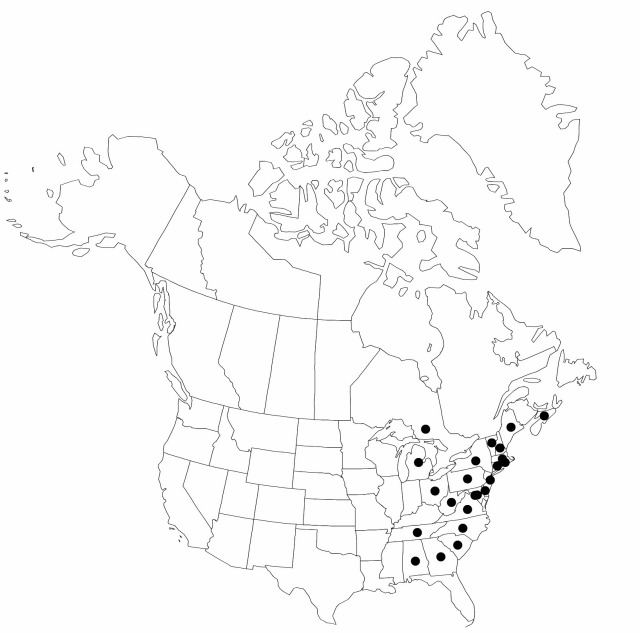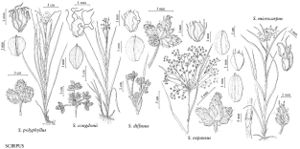Scirpus expansus
Rhodora 45: 293, plate 767, figs. 1–3. 1943.
Plants spreading; rhizomes reddish, long, with conspicuous nodes and internodes. Culms: fertile ones upright or nearly so; nodes without axillary bulblets. Leaves 5–8 per culm; sheaths of proximal leaves red; proximal sheaths and blades with septa many, conspicuous; blades 30–68 cm × 9–23 mm. Inflorescences terminal; rays divaricate or occasionally ascending, proximal branches scabrellous (rarely smooth), distal branches scabrous, rays without axillary bulblets; bases of involucral bracts green or reddish, not glutinous. Spikelets in dense clusters of (1–)3–13(–24), (largest cluster with 7 or more), spikelets sessile, ovoid or narrowly ovoid, 2–6 × 1–3 mm; scales black with green midribs, ovate or broadly rounded-ovate to nearly triangular or broadly triangular, 1–2.2 mm, apex rounded to mucronate, mucro (if present) to 0.2 mm. Flowers: perianth bristles brittle-based, readily detached from achene, 6, stout, straight or curved, shorter than to 1.5 times as long as achene, with retrorse, thick-walled, sharp-pointed teeth densely arranged almost to base, at maturity projecting beyond scales; styles 3-fid. Achenes pale brown, oblong-elliptic to broadly elliptic or obovate in outline, plano-convex or sometimes plumply trigonous, 1–1.6 × (0.6–)0.8–1 mm. 2n = 64.
Phenology: Fruiting summer (Jul–Aug).
Habitat: Marshes, wet meadows
Elevation: 0–1100 m
Distribution

N.S., Ont., Ala., Conn., Del., D.C., Ga., Maine, Md., Mass., Mich., N.H., N.J., N.Y., N.C., Ohio, Pa., R.I., S.C., Tenn., Vt., Va., W.Va.
Discussion
North American reports of Scirpus sylvaticus Linnaeus, a widespread Eurasian species, are based on specimens of S. expansus and S. microcarpus.
Scirpus expansus occasionally hybridizes with S. microcarpus, particularly in New England, and the names S. sylvaticus var. bissellii Fernald, S. expansus forma bissellii (Fernald) Fernald, and S. rubrotinctus forma radiosus Fernald are based on specimens of S. expansus × microcarpus. Hybrids are easily recognized by their elongate spikelets in which most of the ovaries are empty and abortive. Despite the low fertility of these hybrids, hybrid populations are able to persist in some places, particularly south of the range of S. microcarpus in the Delaware Valley.
Selected References
None.
